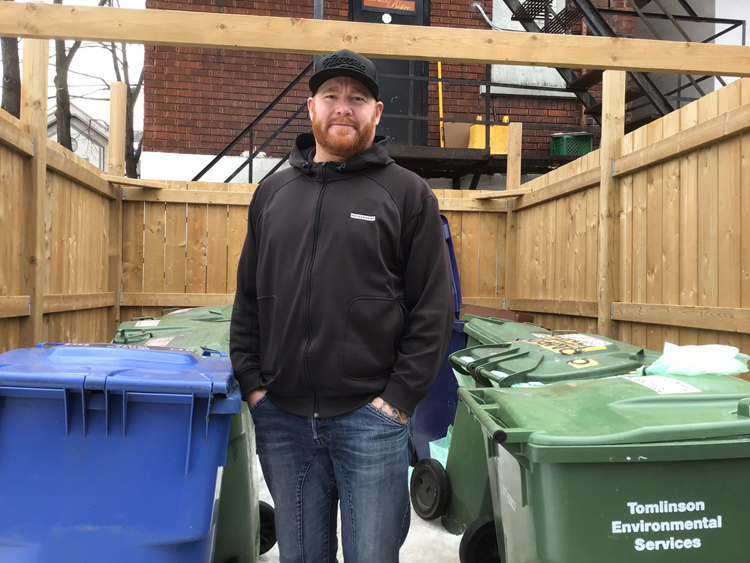By Charlie Senack –
In an effort to cut costs and leave a greener footprint, the owners of Petit Bill’s and Bridgehead Coffee located at Wellington Street West and Smirle Ave., decided to get rid of their traditional garbage dumpsters and start a compost program.
“We went from about eight bags of waste to about one,” says Randy Fitzpatrick, co-owner of Petit Bill’s, who adds that the restaurant has also switched to many biodegradable products.
“Our straws are biodegradable. The first straws we had broke down after 72 days, now they break down basically after 45 days. The portion cups we had and will have again are made from corn sugar, so you literally could eat them.“
Jess Fletcher, executive chef for Bridgehead, says the coffee franchise has also switched to biodegradable products and does audits every year. He says around 90 per cent of Bridgehead’s waste is either recycled or composted, with only about 10 per cent actually going into landfills.

The company trains staff how to compost and recycle.
“All of the [people] at our work stations have a compost bin, a recycling bin and a garbage bin,” states Jess. “We definitely stream at the source and that makes it really easy at the end of the day to stream what’s recyclable, what’s garbage, and what’s compostable.”
In 2016 alone, Canadians threw out 24.9 million tonnes of garbage, according to figures from Statistics Canada, a 0.1 per cent increase from the 24.8 million tonnes of garbage Canadians produced in 2014.
Randy says the new system meant no extra work for his members of staff, and that it actually makes their jobs a little easier.
“Instead of the servers dumping all of the waste into a regular garbage bin, they dump all of the organics into a bucket and the bucket goes to the compost bins behind the restaurant,” says Randy. “In fact, it’s easier on the dishwasher or whoever is taking out the garbage because it’s not a 100 pound garbage bag anymore, it’s a 40 pound bucket of compost with a handle.”
Jess, who has been working for the Bridgehead franchise for almost 10 years, says the company has always championed the environment.
Since starting the project almost a year and a half ago, both Jess and Randy say they have been contacted by other local businesses that want to do their part to decrease their environmental footprint.
Jess says there is no reason why other local businesses shouldn’t follow suit, and that it’s important to take a big step when it comes to protecting our planet. He also encourages businesses to challenge their suppliers to make the change to biodegradable products.
“We live in a world where we should all be making smarter decisions that in the long run are going to impact some positive change in terms of how we treat garbage and the waste that we create,” suggests Jess.
Do you have a story to share about new environmental initiatives in our community? Contact us!